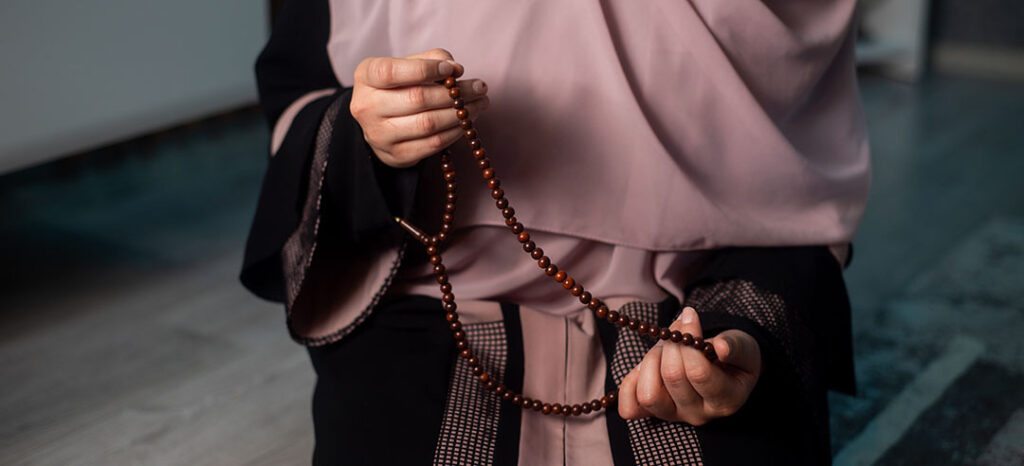Islamophobia poisons debate over Muslim women’s clothing
Islamophobia poisons debate over Muslim women’s clothing
Important discussions of Muslim women’s clothing have time and again been hijacked by politicians seeking to exploit or deepen Islamophobia.
The abaya, a long gown worn traditionally by Muslim women, can no longer be worn by girls in French schools. While the change has been justified as a defence of secularism in the French education system, the true motivations are more complex.
This prohibition is just the latest in an ongoing series of debates and legislative changes aimed at limiting the dress choices of Muslim women in Europe. While Muslims are therefore those who are, by far, the most directly affected by such decisions, they are often absent from the decision-making process. As this article shows by looking at France, Italy, and the United Kingdom, this absence often both allows and is also underpinned by Islamophobic attitudes or those seeking to gain politically from them.
Political games over individual rights
France has been steadily expanding bans on Muslim women’s clothing ever since a 2004 ban on the use of “conspicuous” symbols in state schools and hospitals.[1] On that occasion, Islamic headscarves were the target. By 2023, the latest change has been to ban the abaya, a policy announced by Education Minister Gabriel Attal.[2]
While much discussion of the ban has focused on France’s interpretation of laïcité, often translated as ‘secularism’, the true motives of the policy are more complex. An article from Politico encourages us to consider the ban more as a political play than a choice about faith and dress.
According to said article, the potential of such a ban had long been considered by Macron’s administration but had provoked hesitation. However, following the 2022 elections, Macron needs support from right-wing parties to pass important legislation. Therefore, the policy which has long been called for by the far-right National Rally allows Macron to build bridges with right-wing parties. In addition, with 77% of French people in support of the ban, the prohibition provides a rare moment of relative consensus in a deeply divided nation. [3]
However, the political motives behind the ban also lay bare the lack of agency for Muslim women in this debate. Rather than the Muslim community being at the forefront of the decision, in this case, they seem to have been relegated to a secondary consideration, with politics efficiently overriding individual rights.
Modest swimwear under fire
In Italy, a public debate regarding Muslim women’s clothing was ignited in July following an unsavoury event in the town of Monfalcone. On a local beach, Muslim women who had sought to swim in the sea dressed in burkinis – a form of modest swimwear – were prevented from doing so by other beachgoers. This provoked a confrontation between different groups on the beach. While some defended the rights of the women to dress as they please, others alleged that the use of the burkini was “unhygienic.”[4]
As a debate over the issue emerged in the following days, the mayor of Monfalcone, Anna Maria Cisint, published an open letter to the local Muslim community. Cisint’s letter called the behaviour of “Muslim foreigners” who wore modest swimwear “unacceptable.” She went on to argue that such swimwear was evidence of forms of “Islamisation” of our territory “that cannot be accepted.”[5]
As in the case of France, where the far-right National Rally has led calls for bans on Muslim women’s attire, Cisint belongs to the far-right party Lega Nord. Her comments come following the 2022 election of Giorgia Meloni as prime minister. Meloni has a history of Islamophobic comments. Her party took power with commitments to various Islamophobic policies, such as a ban on the construction of new mosques. Since taking office, her administration has pursued these policies, with significant concern expressed from NGOs and opposition parties about the rights of Italy’s 2.7 million Muslims.[6]
A more compassionate approach
The connection between Islamophobia and attitudes towards Muslim women’s clothing has also been an issue in the recent past in the United Kingdom. The most notorious example was probably that of former Prime Minister Boris Johnson. Johnson, just six months prior to becoming PM, wrote in a highly-publicised article that Muslim women wearing face coverings looked like “bank robbers.”[7] Later research conducted by discrimination monitoring group Tell Mama showed that there was a surge in Islamophobic sentiment in the UK following these comments.[8]
However, while these high-profile comments were significant and while Islamophobia is clearly an issue in the UK, the country has also demonstrated the potential for a more measured approach to the rights of Muslim women. One example has been a report released by the Policy Exchange think tank. Although the think tank is generally considered to lean towards the right wing, in September 2023 they released a report entitled The Symbolic Power of the Veil.[9]
The report makes a series of recommendations to the government regarding the need to protect the rights of Muslim women, particularly in education, when it comes to their free choice of what they wear. Crucially, the report was co-authored by Elham Manea, a Swiss-Yemeni professor and human rights advocate, with a history of involvement in organisations focused on women’s rights. Additionally, the recommendations of the report have been fully endorsed by Muslim Labour MP, Khalid Mahmood.[10]
What is clear is that the type of discussion conducted via this report is vastly different from the examples provided in France and Italy. On the one hand, in Italy and France, debates around Muslim women’s clothing have often been led by non-Muslims and with little consideration for the rights of those affected most. However, while not to say that such attitudes are absent from the UK, there appears to also be an effort to promote the voices of Muslims and women and to tackle more appropriately the legitimate issues that may exist.
Muslim women leading the debate
What is clear from these three examples is that the issue of Muslim women’s clothing is an important issue in modern Europe. However, in order to implement sensitive and appropriate policies, there needs to be a central role for Muslim women and those who understand their motivations.
Instead, as evidenced in this article by France and Italy, but by no means confined to them, Muslim women’s clothing has become a means by which politicians can both deepen and take advantage of Islamophobic attitudes. In many cases, this is done with little consideration of the impact it has on the target of such policies and debates. Therefore, a new approach, placing representation of those most affected at the forefront, is the only route by which a better and more tolerant approach may succeed.
Interested in similar topics? Go to our Dashboard to learn more.
Sources
[1] Case Study: Headscarves and French Schools – EU Learning.
[2] French schools’ ban on abayas and headscarves is supposedly about secularism − but it sends a powerful message about who ‘belongs’ in French culture
[3] Macron’s abaya ban nods to the right, splits the left – POLITICO
[4] ‘Burkini’ row erupts in Italy after mayor criticises Muslim beachgoers – The Local
[5] ‘Burkini’ row erupts in Italy after mayor criticises Muslim beachgoers – The Local
[6] Italy: Meloni’s Islamophobic policies are pushing Muslims to the margins | Middle East Eye
[7] Boris Johnson mocks women in burkas who ‘look like bank robbers’ | Politics News.
[8] Boris Johnson’s burqa comments ‘led to surge in anti-Muslim attacks’.
[9] Government needs to prevent dress code imposition on Muslim women, says think tank | The Independent
[10] Government needs to prevent dress code imposition on Muslim women, says think tank | The Independent






